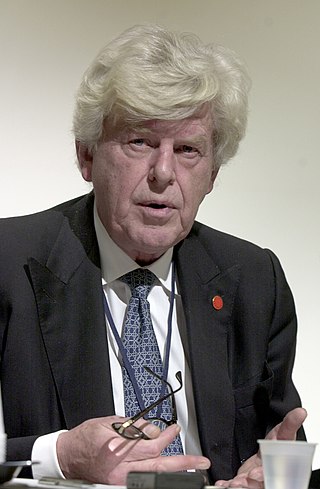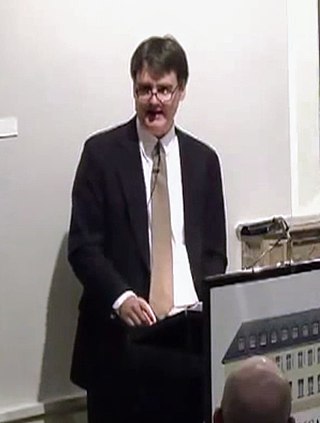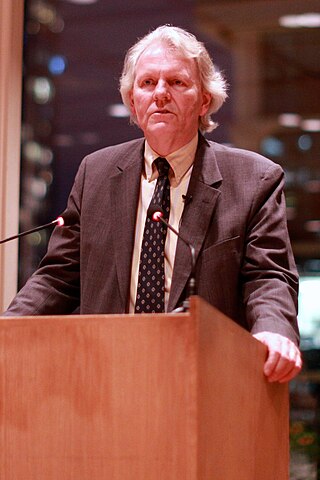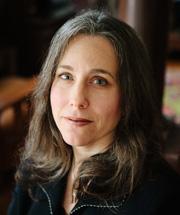Related Research Articles

Willem Frederik "Wim" Duisenberg was a Dutch politician and economist who served as President of the European Central Bank from 1 June 1998 until 31 October 2003. He was a member of the Labour Party (PvdA).
Governance is the overall complex system or framework of processes, functions, structures, rules, laws and norms borne out of the relationships, interactions, power dynamics and communication within an organized group of individuals which not only sets the boundaries of acceptable conduct and practices of different actors of the group and controls their decision-making processes through the creation and enforcement of rules and guidelines, but also manages, allocates and mobilizes relevant resources and capacities of different members and sets the overall direction of the group in order to effectively address its specific collective needs, problems and challenges. The concept of governance can be applied to social, political or economic entities such as a state and its government, a governed territory, a society, a community, a social group, a formal or informal organization, a corporation, a non-governmental organization, a non-profit organization, a project team, a market, a network or even the global stage. Governance can also pertain to a specific sector of activities such as land, environment, health, internet, security, etc. The degree of formality in governance depends on the internal rules of a given entity and its external interactions with similar entities. As such, governance may take many forms, driven by many different motivations and with many different results.
Dr. John T. Scholz is the Francis Eppes Distinguished Professor of Political Science and a Courtesy Professor of Law at Florida State University. As the first political scientist to formulate the "regulation game," which was later extended in influential work on responsive regulation by John Braithwaite and Ian Ayres. Scholz is widely regarded as one of the leading political scientists addressing regulatory enforcement.
Colin Peter Mayer was the Peter Moores Professor of Management Studies at the Saïd Business School at the University of Oxford. He was the Peter Moores Dean of the Saïd Business School between 2006 and 2011. He is a fellow of the British Academy, a fellow of the European Corporate Governance Institute, a fellow of the Royal Society of Arts, and a research fellow of the Centre for Economic Policy Research. He is a professorial fellow of Wadham College, Oxford, an honorary fellow of St. Anne's College, Oxford, and an honorary fellow of Oriel College, Oxford. He is an ordinary member of the Competition Appeal Tribunal and was a member of the UK government Natural Capital Committee. Over the last decade he has made the case against narrow shareholder value maximization by business firms and instead promoted the broader view of business purpose to promote economic and social well-being.
Paul Lyndon Davies KC (Hon), FBA is Allen & Overy Professor of Corporate Law Emeritus at the University of Oxford, Emeritus Fellow of Balliol College, Oxford, Emeritus Fellow of Jesus College, Oxford, and Emeritus Professor of Law at the London School of Economics, where he was the Cassel Professor of Commercial Law from 1998 to 2009. He is an honorary Bencher of Gray’s Inn.
The Samuel and Ronnie Heyman Center on Corporate Governance is an academic research center whose mission is to raise public and academic awareness of current corporate and securities law issues, to produce and disseminate research on a broad range of topics in these fields, and to educate and train students and professionals. The Heyman Center is part of at the Benjamin N. Cardozo School of Law located at 55 Fifth Avenue in the Union Square area of New York City.
Walter Mattli is a supernumerary fellow at St. John's College of the University of Oxford, England. He served as fellow in politics at St. John's College and professor of international political economy in the Department of Politics and International Relations at Oxford. Mattli was a senior member of the Oxford International Relations Society.
Benedict William Kingsbury is Vice Dean and Director of the Institute for International Law and Justice at New York University and a leading scholar in international law and diplomacy. He was recently also announced as a faculty director for the new NYU Law Guarini Institute for Global Legal Studies. Born in Holland and raised in Hamilton, New Zealand he was a Rhodes Scholar in 1982, a commercial law graduate from Canterbury University in Christchurch, New Zealand and a doctor of International Relations and Law at Balliol College, University of Oxford. He lectured at Oxford University and Duke University prior to his New York University Law School appointment. He is an honorary citizen of San Ginesio in Italy, the birthplace of Alberico Gentili (1552-1608). He received an honorary doctorate in law from Tilburg University in 2016. From 2013 to 2018 he was joint Editor in Chief of the American Journal of International Law. He received NYU Law School's Podell Distinguished Teaching Award in 2019.
Peer Zumbansen is the inaugural professor of business law at the faculty of law of McGill University. Before joining McGill in January 2021, Zumbansen held the inaugural chair in transnational law at The Dickson Poon School of Law, King's College London. At King's, he served as the founding director of the Transnational Law Institute, and the faculty co-director of the Transnational Law Summer Institute [TLSI]. Since 2018, he is co-director of the Transnational Law Institute, together with Dr Emily Barritt and Dr Octavio Ferraz, both of the Dickson Poon School of Law.
The constitutional law of the United States is the body of law governing the interpretation and implementation of the United States Constitution. The subject concerns the scope of power of the United States federal government compared to the individual states and the fundamental rights of individuals. The ultimate authority upon the interpretation of the Constitution and the constitutionality of statutes, state and federal, lies with the Supreme Court of the United States.

Peter Lindseth is Olimpiad S. Ioffe Professor of International and Comparative Law, at University of Connecticut.
Roberta Romano is Sterling Professor of Law at the Yale Law School. She is the first woman at Yale Law School to be named a Sterling Professor. Roberta Romano joined the Yale Law School faculty as a professor of law in 1985. She was named the Allen Duffy/Class of 1960 Professor of Law in 1991 and the Oscar M. Ruebhausen Professor of Law in 2005. She is Director of the Yale Law School Center for the Study of Corporate Law and Professor at the Yale School of Management.

Raffaele Marchetti is an Italian political scientist and editorialist.

Michael J. Prince is a Canadian political scientist and public policy and administration scholar. Prince is the Lansdowne Professor of Social Policy at the University of Victoria in Canada.
Angela Wigger is a political economist at the Political Science department at the Radboud University in the Netherlands.
Eilís Veronica Ferran, FBA is a Northern Irish solicitor, legal scholar, and academic administrator. As an academic, she specialises in company law, financial regulation, and corporate finance. She has been Professor of Company and Securities Law at the University of Cambridge since 2005, and its Pro-Vice-Chancellor for Institutional and International Relations since 2015.
Renaud Dehousse is a Belgian lawyer and professor, born on the 2 June 1960 in Liège, Belgium. He was the President of the European University Institute (EUI) in Florence, Italy.

Jennifer Taub is an American law professor, advocate, and commentator focusing on corporate governance, financial market regulation, and white collar crime.
Grace Skogstad is a Canadian political scientist and professor at the University of Toronto. and a cross-appointed affiliate faculty in the Munk School of Global Affairs and Public Policy at the University of Toronto.
Roel Vermeulen is a Dutch scientist and professor at Utrecht University and University Medical Center Utrecht, the Netherlands in the field of environmental epidemiology and exposome. His scientific research focuses on environmental risk factors for cancer and neurological diseases, with a strong emphasis on the integration of epidemiology, high-quality exposure assessment and molecular biology in multidisciplinary studies.
References
- ↑ Prof. dr. J.A. McCahery, 1956 - at the University of Amsterdam Album Academicum website.
- ↑ Bratton, William W., and Joseph A. McCahery. "The Equilibrium Content of Corporate Federalism." Wake Forest Law Review 41.3 (2006): 619.
- ↑ Bratton, William W., and Joseph A. McCahery. "Tax coordination and tax competition in the European Union: evaluating the Code of Conduct on Business Taxation." Common Market Law Review 38.3 (2001): 677-718.
- ↑ Versterk de Ondernemingskamer. Het Financieel Dagblad Woensdag 20 December, page 9 (with L. Bouchez).
- ↑ "Approachable Professor". www.law.auckland.ac.nz. Retrieved 2015-05-07.
- ↑ "Küresel Mali Piyasalar ve Düzenlemelerin Geleceği - Global Financial Markets and Future of Regulation". spk.gov.tr. Archived from the original on 2015-09-24. Retrieved 2015-05-07.
- ↑ "Biography of Professor Joseph McCahery". ecgi.org. Retrieved 2015-05-07.
- ↑ "McCahery, Joseph A. Jr". Università della Svizzera italiana. Retrieved 2015-05-07.
- ↑ The Economics of the Proposed European Takeover Directive (PDF). The Centre for European Policy Studies. 2003-01-03. ISBN 9290794283 . Retrieved 2015-05-07.
{{cite book}}:|website=ignored (help) - ↑ "CFA Society Netherlands" (PDF). cfasociety.org. CFA. 2012-10-02. Retrieved 2015-05-07.
- ↑ "Researcher Profiles". lexresearch.nl. Retrieved 2015-05-07.
- ↑ Bratton, William W., and Joseph A. McCahery. "Comparative corporate governance and the theory of the firm: The case against global cross reference." Colum. J. Transnat'l L. 38 (1999): 213.
- ↑ McCahery, Joseph A., Zacharias Sautner, and Laura T. Starks. "Behind the scenes: The corporate governance preferences of institutional investors." AFA 2011 Denver Meetings Paper. 2011.